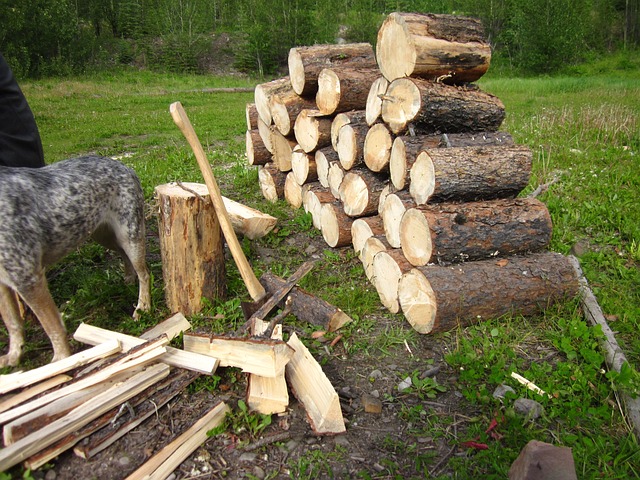Firewood has been a valuable commodity for centuries, providing warmth, comfort, and a means of cooking for countless households. If you have access to a supply of firewood and are wondering how to turn it into a profitable venture, you’re in the right place. In this comprehensive guide, we’ll explore everything you need to know about selling firewood, including where to sell logs near you, the best places to sell firewood, and how to start a successful firewood business.
Finding the Right Firewood Supply
Before you can start selling firewood, you need a reliable supply. Here are some ways to source firewood:
1. Harvest Your Own Firewood
- If you have access to a wooded area, you can cut and split your own firewood. This can be a cost-effective way to start your firewood business.
- Ensure that you follow local regulations and obtain necessary permits for harvesting firewood on public or private land.
2. Partner with Tree Removal Services
- Tree removal companies often have excess wood that they need to dispose of. You can establish partnerships with these companies to acquire logs at a lower cost.
3. Purchase Firewood from Local Loggers
- Local loggers may have logs that are suitable for firewood. Buying logs from them can be a convenient way to secure a steady supply.
Preparing and Storing Firewood
To sell high-quality firewood, you must properly prepare and store it. Here’s what you need to do:
1. Cut and Split Firewood
- Use a reliable chainsaw and a log splitter to cut logs into manageable pieces.
- Ensure that the pieces are the right length for your customers’ needs, typically around 16 inches.
2. Season Your Firewood
- Seasoning is the process of drying firewood to reduce moisture content. Properly seasoned wood burns more efficiently and produces less smoke.
- Stack your cut firewood in a dry, well-ventilated area and allow it to season for at least six months to a year.
3. Store Firewood Properly
- Store your seasoned firewood off the ground on pallets or a raised platform to prevent moisture absorption.
- Cover the firewood with a tarp or other waterproof material to protect it from rain and snow.
Where to Sell Firewood
Now that you have a supply of seasoned firewood, it’s time to explore the various avenues for selling it. Here are some options:
1. Local Farmers’ Markets
- Farmers’ markets are excellent venues for selling firewood, especially during the colder months. Set up a stall and offer bundled firewood for sale.
2. Online Marketplaces
- Use online platforms like Craigslist, Facebook Marketplace, and local classified websites to reach a broader customer base.
- Include high-quality images and detailed descriptions of your firewood products in your online listings.
3. Gas Stations and Convenience Stores
- Approach local gas stations and convenience stores to inquire about selling your firewood in their stores.
- Ensure that your firewood is neatly bundled and clearly labeled.
4. Campgrounds and RV Parks
- Campers and RV enthusiasts often need firewood for their outdoor adventures. Contact nearby campgrounds and RV parks to discuss supplying firewood to them.
5. Hardware Stores and Home Improvement Centers
- Approach hardware stores like Lowe’s, Ace Hardware, and Home Depot to see if they are interested in selling your firewood bundles.
- Provide competitive pricing and reliable delivery options.
6. Establish a Roadside Stand
- Set up a roadside stand in a high-traffic area, offering firewood to passersby. Make sure to check local regulations for permits and zoning requirements.
7. Create a Website and Offer Delivery
- Create a professional website to showcase your firewood products and allow customers to place orders online.
- Offer delivery services to make it convenient for customers to get their firewood.
Building a Successful Firewood Business
To build a thriving firewood business, you need to consider several key factors:
1. Pricing Strategy
- Research your competitors’ prices and set competitive rates for your firewood.
- Consider offering discounts for bulk purchases or repeat customers.
2. Marketing and Promotion
- Use online and offline marketing strategies to promote your firewood business.
- Utilize social media, email marketing, and local advertising to reach potential customers.
3. Customer Service
- Provide excellent customer service to build a loyal customer base.
- Address customer inquiries promptly and professionally.
4. Delivery Options
- Offer flexible delivery options, including same-day or scheduled deliveries, to accommodate your customers’ needs.
- Ensure your delivery vehicles are well-maintained and safe.
5. Scaling Your Business
- As your business grows, consider expanding your product offerings to include related items like kindling, fire starters, and firewood racks.
- Explore opportunities to serve larger commercial clients, such as restaurants and resorts.
Legal and Environmental Considerations
Running a firewood business comes with legal and environmental responsibilities. Be sure to address these concerns:
1. Permits and Regulations
- Check local, state, and federal regulations related to harvesting, selling, and transporting firewood.
- Obtain any required permits or licenses.
2. Sustainable Practices
- Harvest firewood responsibly and sustainably to minimize environmental impact.
- Educate your customers about the importance of using sustainably sourced firewood.
3. Safety Measures
- Prioritize safety in all aspects of your business, from harvesting and processing firewood to delivery and customer interactions.
- Ensure your employees receive proper safety training.
Maximizing Profits and Efficiency
To maximize your profits and operational efficiency, consider these strategies:
1. Diversify Your Product Line
- Offer different types of firewood, such as hardwood and softwood, to cater to various customer preferences.
- Sell by-products like wood chips or sawdust to minimize waste.
2. Seasonal Planning
- Anticipate seasonal demand fluctuations and adjust your inventory and marketing efforts accordingly.
- Offer promotions and discounts during the off-season to maintain cash flow.
3. Efficient Operations
- Streamline your business operations by optimizing supply chain management, inventory control, and delivery routes.
- Invest in equipment and technology to improve efficiency.
Overcoming Challenges
Running a firewood business may come with its share of challenges. Here are some common obstacles and how to overcome them:
1. Weather-Dependent Business
- Weather can significantly impact firewood sales. Plan for seasonal fluctuations and consider offering other products or services during slow periods.
2. Competition
- Be prepared to face competition from other firewood suppliers. Differentiate your business by offering superior quality, customer service, or unique products.
3. Pricing Pressures
- Price competition can erode profits. Focus on providing value through quality products and services rather than engaging in price wars.
4. Marketing and Visibility
- Continuously invest in marketing and advertising to maintain visibility and attract new customers.
- Leverage customer reviews and testimonials to build trust.
Conclusion
Selling firewood can be a profitable venture if done right. With the right supply, preparation, and marketing strategy, you can turn a renewable resource into a successful business. Remember to prioritize sustainability, customer satisfaction, and legal compliance as you build and grow your firewood business. Whether you’re selling firewood online, at local markets, or through partnerships with retailers, the demand for this essential commodity can provide a steady income and a rewarding business endeavor.





